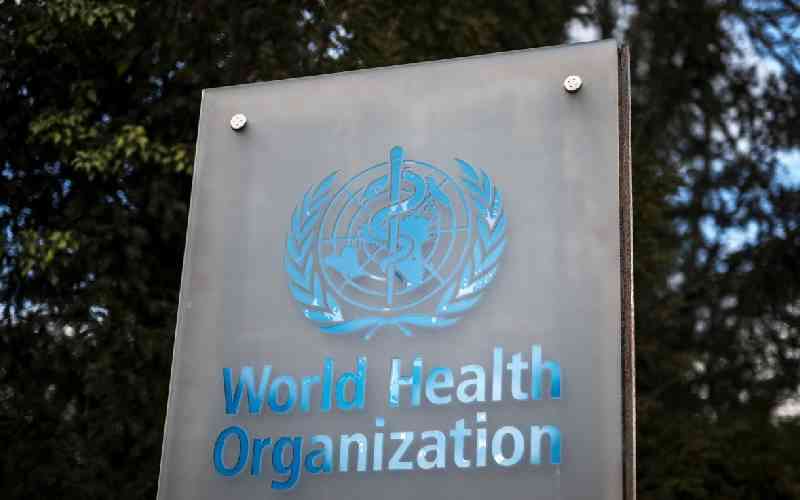
Health financing is key in the implementation of the Universal Health Coverage (UHC) at a time when Kenya is spending more resources on curative services, according to experts.
Ministry of Health Acting Director General Dr Patrick Amoth said the Social Health Financing Bill, to be signed into law today (Thursday) by President William Ruto will enable all Kenyans to access quality care, regardless of their financial status.
"Heath financing is key in achieving UHC. Social Health authority will come in as a strategic pulling of healthcare service," said Dr Amoth.
Speaking during the ongoing UHC conference in Kericho, Amoth said the Social Health Authority will ensure the country develops a prepaid mechanism for funding the healthcare system and avoiding unpredictable out-of-pocket failing Kenyans in need of care.
"Social Health Authority will have the rich support the poor, while young individuals will support the elderly. Healthy people will pay premiums and support the sick who have chronic diseases. This is how to protect us from more expenditure. The changes will ensure the protection of everybody," said Amoth.
Social Health Authority will transit from the current National Health Insurance Fund (NHIF), in 12 months, after President Ruto appends his signature to the Four proposed UHC bills.
With the proposed bill, every individual above the age of 18 years will pay an amount yet to be agreed upon in Regulations to the Social Health Insurance Fund while the Government will set aside money for the Primary Healthcare Fund and the Emergency, Chronic and
- Government to pay Sh5.3 billion NHIF arrears to hospitals
- UHC workers threaten strike, demand permanent terms and gratuity
- Why Kenyans feel NHIF was better than SHA
- Ruto urges Kenyans to report hospitals that charge SHA members
Keep Reading
However, mid this year, Ruto proposed a 2.75 per cent contribution to the scheme which will be proposed in the Regulations to the Social Health Insurance Bill, which is not yet in the proposed Bill.
Once the Bill is signed, the Ministry of Health, in consultation with the Board of the Social Health Authority, will develop Regulations to have Kenyans contribute at a modality of 2.75 per cent capped at a minimum of Sh300 and a maximum of Sh5,000.
Dr Daniel Mwai, a health economist and also a Presidential health advisor, added that under primary health care, there is a prevention concept.
"NHIF is a colonial defeat that has never taken action in terms of changes to reflect what is required in managing health in the country," said Dr Mwai.
Mwai added that President Ruto is committed to UHC, as it has a solution for the healthcare system which has in the past grappled with the provision of care.
Money collected in hospitals under the Financial Bill according to Mwai will improve healthcare services in counties.
Mwai applauded Nakuru County, saying it is the only county in the country that utilises money collected in hospitals to improve facilities and healthcare.
"Better management of finances collected in hospitals is key. Nakuru gets the highest money in public as compared to private, unlike what we are experiencing in other counties," added Mwai.
On her part, Jane Ngugi, private sector engagement in health investment and health financing at USAID said there is a need for a proper financing mechanism for smooth service delivery.
"There is a need to build a financial plan and do what is expected. Kenya is determined towards the course," she said.
Doris Kirigia, WHO Africa representative on her part explained that UHC will enhance social determination of health among the population.
Concerning the pay model for the kitty with only 20 per cent of Kenyans in the formal sector, Kiriga said the pay will be subsidised.
However, even with 80 per cent of Kenyans being in the informal sector, the official said a number can raise money for the Social Health Authority.
"There shall be subsidy when it comes to premiums, but also let's not assume the informal sector is not able to pay because the majority, I mean are involved in enterprises.
They can generate resources, and they're able to pay them. So it's important that we undertake the assessment of average the ability for each household," said Kiriga.
Further, the official commended the country for establishing social health insurance.
"...and we must ensure each citizen pays. It is important to estimate what each household commensurate," she added.
 The Standard Group Plc is a multi-media organization with investments in media
platforms spanning newspaper print
operations, television, radio broadcasting, digital and online services. The
Standard Group is recognized as a
leading multi-media house in Kenya with a key influence in matters of national
and international interest.
The Standard Group Plc is a multi-media organization with investments in media
platforms spanning newspaper print
operations, television, radio broadcasting, digital and online services. The
Standard Group is recognized as a
leading multi-media house in Kenya with a key influence in matters of national
and international interest.











